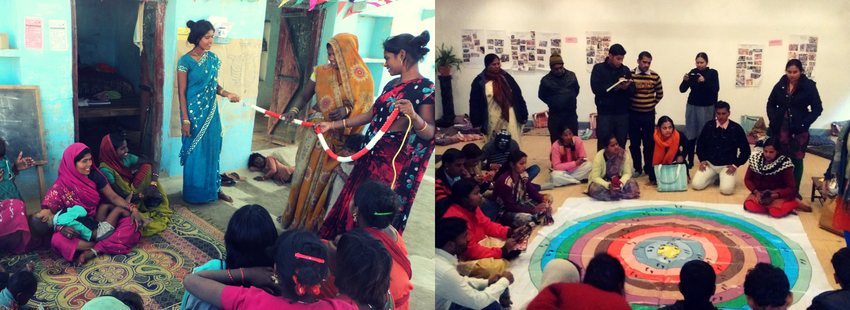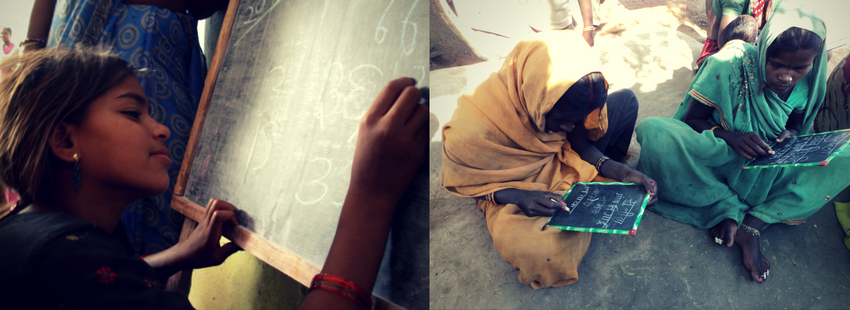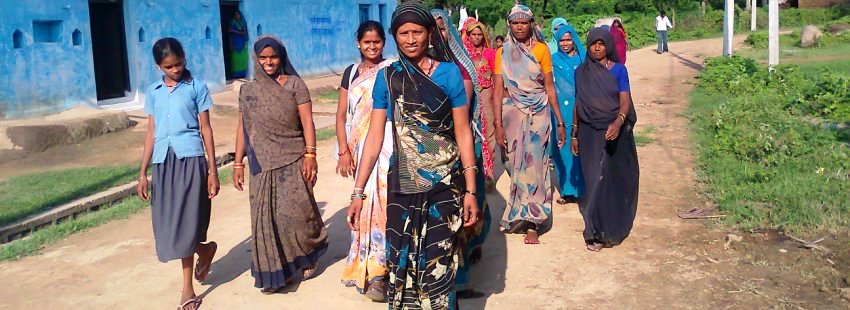Women’s Education and Empowerment
Our work, aimed at women and girls from marginalised communities, involves literacy as well as education - defined more broadly as structured learning that empowers the learners. We engage with literacy in a way has women themselves at its centre, and also their rights, needs, and interests, including the pleasure of reading and engaging with a world beyond their own.
Nirantar’s journey with working on adult literacy began in a context wherein even if the literacy standards were soaring as compared to previous standards, adult women’s literacy standards, 15 years and above, remained stagnant and abysmal. Mainstream adult literacy programmes often seek to project women as better mothers and responsible citizens.
In 1986, women’s education was addressed as part of the larger national education strategy and in accordance the Mahila Samakhya (MS) programme was established. Nirantar collaborated with the MS, Uttar Pradesh to develop a residential education programme for rural women and in conducting residential courses. Gradually, programmes working on women’s livelihoods, SHGs and leadership through Panchayats and federations started to realise the indispensability of adult literacy in creating women’s leadership and empowerment. However, in an environment that lacks capacity-building trainings and literacy material from a rights-based and empowerment perspective, Nirantar offered and still works towards filling this dearth.
To actualize its own vision for literacy, in the year 2002-03 Nirantar spearheaded a community- based programme called the Sahjani Shiksha Kendra (SSK) in Lalitpur district of Uttar Pradesh, for women and adolescent girls belonging to the most marginalised communities of the region, including Dalits and Adivasis. The programme aimed at empowering these women and girls by linking their lived realities to its educational initiatives and bringing them into various leadership roles, now operating as an independent organisation.
Under our current literacy programme, we offer structured and intensive inputs with regards to planning, training, monitoring and evaluation over a period of 3 years to partner organisations that aim to start literacy programmes. Till date, Nirantar has built capacities for 30 organisations that have in turn worked with over 20,000 women learners.
Interventions
Nirantar believes that literacy is critical for autonomy, self-expression, accessing entitlements and challenging exploitation. We intensively build capacities and develop materials for organisations who want to provide empowering literacy opportunities, from planning to training, monitoring, and evaluation.
Building Capacities and Advocating for Women's Literacy: For long, literacy has not been considered important by the state and civil society organisations. In recent years, the demand for literacy has emerged especially from women belonging to marginalised groups and communities. These women have come into the ‘public sphere’ through women’s collectives, Self-Help Groups (SHGs), federations, and through reservation in local governance.
Nirantar responds to the needs of the agenda of adult women’s literacy, by entering into intensive partnerships with NGOs. Our capacity building enables organisations to run literacy programmes by addressing the entire range of issues involved in designing such a programme - including the approach, operational strategies, capacity building, monitoring and evaluation, curriculum and material creation.
Our team at Nirantar offers intensive inputs to each of our literacy partner organisation, along with initial orientation and advanced phase literacy training, capacity building of the staff members involved in the programme, a refresher training for teachers and educators, and planning strategies for various phases of the programme. Monitoring and evaluation is another crucial part of our programme structure, where the strategies, implementation, and outcomes are assessed not just quantitatively, but qualitatively also. We have developed comprehensive MIS tools under our programme which are disseminated to our partner organisations through orientation training, along with documentation workshop for staff members working at various levels in the organisation to be able to keep track and record the activities of their programme. In addition, we facilitate mid-term ‘review and reflection’ meetings and field visits with our partner organisation to evaluate the planning, follow ups, and feedback process.
In addition, we conduct Phased Trainings for Literacy Programmes for our selected partner organisations that are structured as follows:
- Teacher trainings: Focussing on teaching/learning process, pedagogy of mathematics and language teaching, along with use of literacy primers and activities in (adult) literacy work. These trainings are conducted with selected teachers from grass-roots organisations
- Content creation: Nirantar works with partner organisations (advanced stage) in implementing literacy programmes and materials, creating contextual reading material, especially resource material for neo-literate readers
- Field support: On request, members of Nirantar visit the organisations for need assessment at the field level, and to better understand and respond to the requirements of these organisations
- Monitoring and Evaluation workshops: Nirantar assists in building an understanding of monitoring and evaluation, as well as a thorough MIS (Management Information System), to help organisations in creating the framework and indicators for M&E, and also to develop monitoring tools
- Advanced strategy planning: We help the grassroots with focused inputs on continuing education and literacy strategies – for instance, the literacy-camp methodology
Knowledge Creation and Educational Material: Nirantar creates and publishes a range of literacy-related material, both by itself and jointly with partner organisations. Over the years, we have developed well-known and widely used resources such as curricula, primers, manuals on the themes of SHGs, Gender & Health, Panchayat, and Numeracy. The resources also reflect the larger idea of adult literacy going beyond acquiring skills of reading and writing to build critical thinking. We aim at building the linkages between gender and education in women’s lives, and also for the joy of reading through our material. Field interactions are a crucial part of developing the material, so that their efficacy is tested in the very process of creation. Helping grassroot organisations create resource material in Hindi and other regional languages for and by newly-literate women is essential to our work as well.
Click here for more information on our Literacy oriented resource material
Advocacy for Promoting Adult Women’s Literacy: Surprising silence persists around the issue of adult women’s literacy from both state and non-government actors alike. Nirantar participates in advocacy spaces to highlight the significance of literacy in the lives of adult women from marginalised groups. We have campaigned for the issue of adult literacy with the State through policy formulations and being part of drafting Sakshar Bharat. Along with this, we constantly engage with civil societies and partner organisations, and national-international advocacy platforms to talk about issues and field realities of literacy for adult women.
Nirantar conducts yearly ‘Annual Literacy and Empowerment Training’ which is a seven-day residential training that enables potential partner organisations to design, implement and monitor literacy programmes. This training aims at building perspective on literacy, gender, and empowerment, combined with skill-building on teaching language and numeracy.
We have provided a thorough analysis of the state of education in the country from the pre-primary onwards till adult education. We were also involved in writing the chapters on Education for the parallel reports prepared by civil society organisations for the UN CEDAW and ESCR committees. As active partners in advocacy efforts in the country, we were involved in taking forward the concluding observations of CEDAW and UNESCR. Additionally, we have engaged with the process of the Universal Periodic Review III at the national-level to comment on and provide recommendations with regards to education within the country.



